Public Holidays in Bali and Indonesia 2025: A Handy Guide
Planning a trip to Bali or other parts of Indonesia in 2025? Understanding the public holiday in Bali 2025 can help you better navigate your trip. Whether you are a foreign tourist or an international traveler, knowing when holidays occur can affect everything from transportation availability to local attractions being open or closed.
Indonesia’s national and religious holidays are observed nationwide, with specific public holidays unique to Bali. These holidays are celebrated with traditional customs and local rituals, creating a rich cultural experience for visitors. In this guide, you will find everything you need to know about Indonesia’s public holidays, religious observances, and the local holidays celebrated only in Bali.

Indonesia National Holiday Calendar 2025
Indonesia observes numerous national public holidays that are celebrated across the country. Some of these holidays are based on the Gregorian calendar, while others follow a lunar or religious schedule. Here is a quick rundown of key dates to remember for public holiday in Bali 2025.
Wednesday, 1 January – New Year Day

New Year’s Day is a national holiday in Indonesia and marks the start of the year. On this day, government offices, schools, and businesses will be closed, though tourist attractions like Atlas Beach Club in Bali remain open, making it a great time for international tourists to enjoy the beach and nightlife.
Wednesday, 29 January – Chinese New Year
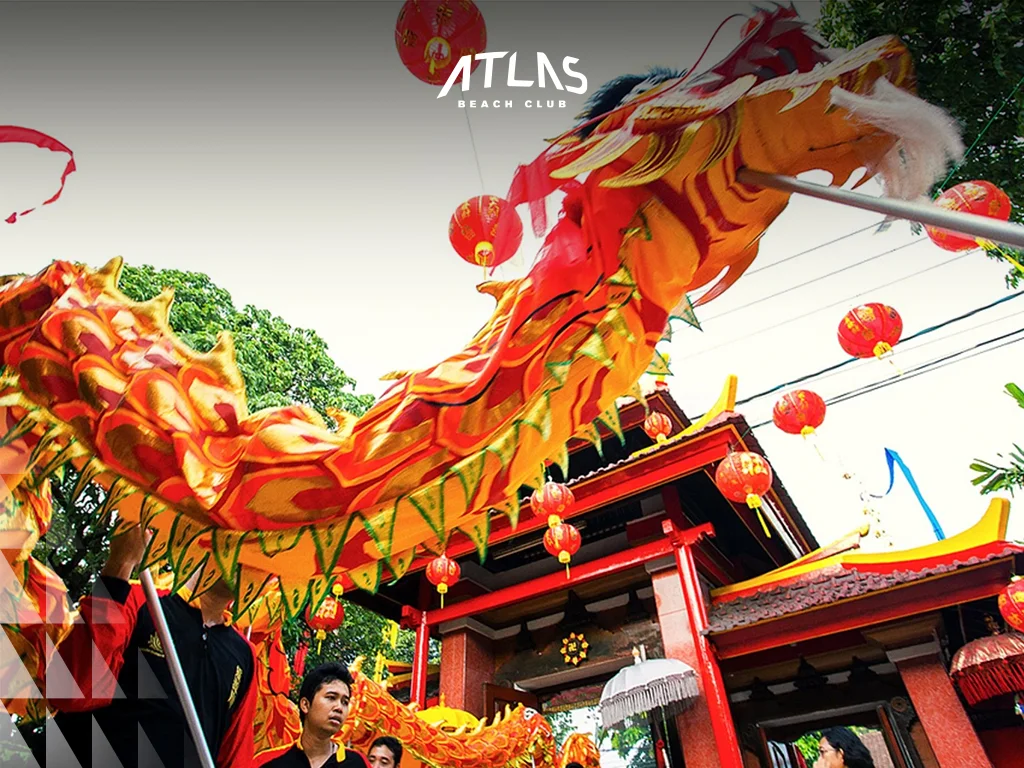
Chinese New Year, known locally as Imlek, is celebrated by the Chinese-Indonesian community. While this is not a public holiday across all regions, it is a recognized national holiday and widely celebrated, especially in urban areas and Bali. Expect festivities, parades, and vibrant celebrations.
Saturday, 1 March – International Labor Day
Labour Day is an international observance that is officially celebrated across Indonesia. Workers enjoy a day off, and in Bali, many local establishments and tourist spots host events and celebrations. It’s a great time for visitors to experience the local culture.
Sunday, 1 June – Pancasila Day
Pancasila Day commemorates the foundation of Indonesia’s state ideology. Government offices and institutions typically observe this public holiday, with many businesses closing for the day. It’s a quiet day that can be used to explore Bali’s cultural sites.
Sunday, 17 August – Independence Day
One of Indonesia’s most significant holidays, Independence Day celebrates the country’s declaration of independence from Dutch colonial rule. Festivities are held nationwide, including in Bali, where visitors can partake in traditional ceremonies and public celebrations.
Religious Holidays in Indonesia
Indonesia is a multi-religious nation with a rich tapestry of traditions, ceremonies, and celebrations that reflect its diverse cultural landscape. Religious holidays in Indonesia are not only important for spiritual observance but also play a key role in bringing communities together. These holidays are an integral part of the Indonesian way of life and are celebrated with great devotion by millions of people across the archipelago.
While Indonesia officially recognizes six religions — Islam, Christianity (Catholicism and Protestantism), Hinduism, Buddhism, Confucianism, and indigenous belief systems — the majority of the population adheres to Islam. The religious holidays in Indonesia are a mix of Islamic, Christian, Hindu, and Buddhist celebrations. In 2025, these holidays will continue to shape the cultural and social landscape of the country, including Bali, where Hindu religious observances are particularly significant.
Here’s a closer look at some of the key religious holidays in Indonesia for 2025:
Monday, 27 January – Ascension of the Prophet Muhammad (PBUH)
Ascension of the Prophet Muhammad (PBUH) is an important day for Muslims in Indonesia, commemorating the night when the Prophet Muhammad ascended to the heavens (Isra’ Mi’raj). This event is seen as a symbol of the Prophet’s spiritual journey and his close relationship with Allah.
Key features of this holiday include:
- Special prayers held in mosques across Indonesia, including early morning prayers (Salat al-Tarawih).
- Recitations of Quranic verses to honor the Prophet.
- Community gatherings for prayer and reflection.
Although not as widely celebrated as Eid al-Fitr or Eid al-Adha, this holiday is important for Indonesian Muslims and is typically observed with solemnity and devotion.
Saturday, 29 March – Nyepi (Day of Silence)
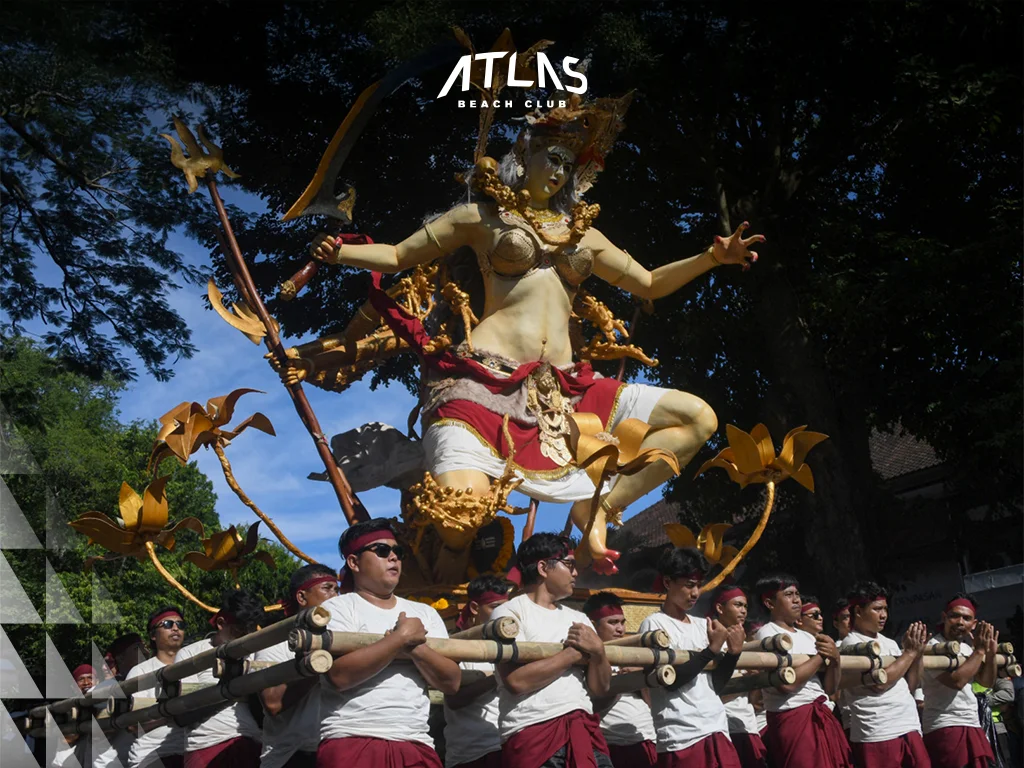
Nyepi is the Hindu New Year celebration in Bali, observed according to the Balinese Saka calendar. It is unique in that it is a day of complete silence, where the entire island of Bali comes to a standstill, including its international tourists. Nyepi is a day of reflection, fasting, and meditation.
Key highlights of Nyepi include:
- Silence: All businesses, roads, and even the airport are closed for 24 hours.
- Ogoh-Ogoh: The day before Nyepi, Balinese people create large effigies (Ogoh-Ogoh) representing evil spirits. These are paraded through the streets and then burned in a symbolic ritual to drive away bad influences.
- Self-reflection: Hindus in Bali use this time for introspection, prayer, and spiritual renewal.
For international tourists, Nyepi offers a rare opportunity to experience Bali in its most serene and spiritual form, though it’s important to note that no public activities take place on this day.
Monday, 31 March to Tuesday, 1 April – Eid al-Fitr
Eid al-Fitr, or Hari Raya Puasa, marks the end of Ramadan, the Islamic holy month of fasting. It is one of the most important religious holidays in Indonesia, celebrated with great joy and festivity. After a month of fasting, Muslims gather for communal prayers, feasts, and give to charity.
Key aspects of Eid al-Fitr include:
- Eid prayers in mosques, followed by family gatherings and meals.
- Zakat al-Fitr: The practice of giving alms to the poor before the Eid prayers to ensure that everyone can celebrate the holiday.
- Feasts and festivities: Homes are decorated, and families often gather for meals, sharing traditional dishes.
This holiday is one of the busiest times in Indonesia, with people traveling across the country to be with their families, creating a vibrant atmosphere of reunions and celebration.
Friday, 18 April – Good Friday
For Christian Indonesians, Good Friday marks the day of the crucifixion of Jesus Christ. It is a day for reflection on the sacrifice of Jesus and is observed with church services, prayer, and fasting.
Key elements of Good Friday include:
- Church services: Special Good Friday services in Catholic and Protestant churches.
- Reflection on the Passion of Christ: Worshippers remember the suffering and death of Jesus.
- Fasting and prayer: Many Christians fast and pray in reverence.
Although not as widely celebrated as Christmas, Good Friday holds deep religious significance for Indonesia’s Christian community.
Sunday, 20 April – Easter Day
Easter is one of the most joyous Christian holidays in Indonesia. It celebrates the resurrection of Jesus Christ from the dead, symbolizing hope, renewal, and salvation. Easter Sunday is a festive occasion marked by church services, family meals, and festive activities.
Celebrations on Easter Sunday include:
- Easter services: Churchgoers attend special Easter services that celebrate the resurrection of Jesus.
- Easter egg hunts and other family traditions.
- Feasts and gatherings: Families come together to celebrate with food, often including traditional Easter dishes.
For international tourists, visiting churches and participating in Easter celebrations in cities like Jakarta, Yogyakarta, and Bali is an opportunity to experience the religious and cultural diversity of Indonesia.
Monday, 12 May – Vesak Day
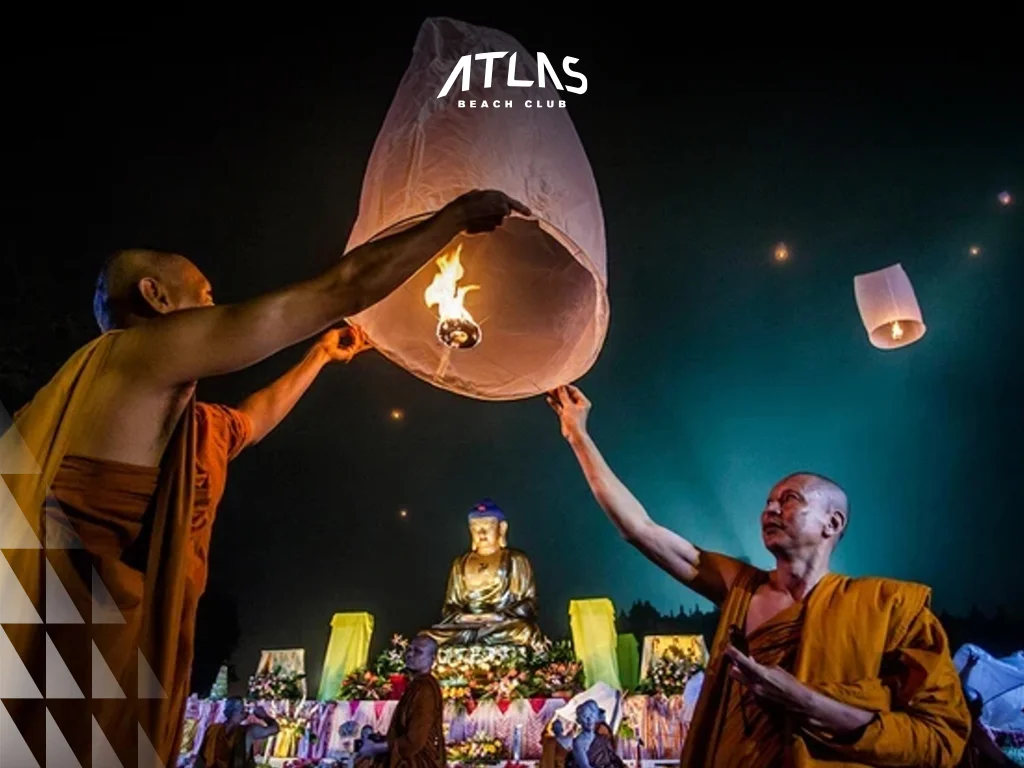
Vesak Day, also known as Buddha’s Birthday, celebrates the birth, enlightenment, and death of Gautama Buddha. It is a significant holiday for Indonesia’s Buddhist community, particularly in regions like Bali, where Buddhism is practiced alongside Hinduism.
Key observances of Vesak Day include:
- Temple ceremonies: Buddhists gather at temples to meditate, make offerings, and listen to sermons.
- Lighting lanterns: Lanterns are released into the sky or floated on water to symbolize enlightenment.
- Acts of charity: Buddhists engage in charitable acts to accumulate good karma.
For tourists, Vesak Day provides an opportunity to witness Buddhist traditions and rituals, especially in Bali, where both Hindu and Buddhist practices coexist.
Thursday, 29 May – Ascension Day of Jesus Christ
The Ascension Day of Jesus Christ is a Christian holiday observed 40 days after Easter, commemorating the ascension of Jesus into heaven. In Indonesia, it is celebrated with church services and prayers.
Highlights of Ascension Day include:
- Church services: Special prayers and services in Catholic and Protestant churches across Indonesia.
- Community gatherings: Christians gather for fellowship and reflection on Jesus’ ascension.
- Charitable giving: As with other Christian holidays, many Indonesians use this day for acts of charity.
Friday, 6 June – Eid al-Adha
Eid al-Adha, also known as Hari Raya Haji, is one of the most important Islamic holidays in Indonesia, commemorating the willingness of Prophet Ibrahim (Abraham) to sacrifice his son in obedience to God. It is marked by special prayers and the sacrifice of livestock, with the meat distributed to the poor.
Observances of Eid al-Adha include:
- Eid prayers: Muslims gather for prayers at mosques.
- Animal sacrifice: Muslims sacrifice sheep, goats, cows, or camels as an act of charity and sharing.
- Family gatherings: Similar to Eid al-Fitr, families gather for meals and celebrations.
Friday, 27 June – First Muharram (Islamic New Year 1447 H)
Muharram marks the Islamic New Year and is considered a time of spiritual reflection, fasting, and renewal for Muslims in Indonesia. It is not celebrated as a major holiday but is observed with prayer and community activities.
Friday, 5 September – The Prophet Muhammad (PBUH)’s Birthday
The birthday of the Prophet Muhammad (PBUH), also known as Mawlid al-Nabi, is an important celebration for Muslims in Indonesia. It is observed with prayers, recitations of the Prophet’s life, and expressions of love for him.
Thursday, 25 December – Christmas Day
Christmas is celebrated by Indonesia’s Christian community to mark the birth of Jesus Christ. While it is a public holiday in the entire country, it is especially significant for Christians in Indonesia.
Key aspects of Christmas Day include:
- Church services: Celebrating the birth of Christ with mass or services.
- Family gatherings: Christians gather to celebrate with meals and gifts.
- Community charity: Giving to the less fortunate is a common Christmas tradition.
Public Holidays in Bali Only
Bali, the Island of the Gods, is not only famous for its natural beauty and rich culture but also for its unique set of public holidays that are deeply rooted in Hindu traditions. These holidays, celebrated only in Bali, are central to the island’s identity and culture. For international tourists or anyone planning to visit in 2025, understanding these special holidays will enhance your travel experience and provide insight into the island’s cultural fabric.
The public holidays in Bali only are typically tied to the Hindu calendar and local ceremonies, making them distinct from the national holidays observed in other parts of Indonesia. Many of these holidays include religious rituals, temple ceremonies, and community gatherings, and they often feature colorful processions, intricate offerings, and traditional performances. As Bali’s population is predominantly Hindu, these holidays take on a profound significance and are observed with great devotion.
Key public holidays in Bali only for 2025:
| Date | Holiday Name | Description |
| Saturday, 27 January | Siwaratri Day | A sacred Hindu holiday dedicated to Lord Shiva, observed with fasting, prayers, and spiritual reflection. |
| Thursday, 8 February | Saraswati Day | Celebrates the goddess of wisdom, knowledge, and the arts, with offerings to books, musical instruments, and sacred texts. |
| Monday, 12 February | Pagerwesi Day | A day dedicated to Lord Vishnu for spiritual protection and prayers. Includes temple ceremonies and offerings. |
| Monday, 22 April | Penampahan Galungan | A preparation day for the Galungan festival, with offerings and temple rituals to celebrate the victory of good over evil. |
| Tuesday, 23 April | Galungan Day (Hari Raya Galungan) | The main celebration of Galungan, marking the victory of good over evil, with family gatherings, prayers, and ceremonies. |
| Wednesday, 24 April | Umanis Galungan | The day after Galungan for reflection and thanksgiving, with smaller ceremonies and family gatherings. |
| Tuesday, 30 April | Kuningan Day (Hari Raya Kuningan) | The final day of the Galungan celebration, honoring ancestors with prayers and offerings. |
| Tuesday, 10 September | Pagerwesi Day | Another day of prayer and worship to Lord Vishnu for spiritual protection, with temple rituals and community prayers. |
| Monday, 18 November | Penampahan Galungan | A second Penampahan Galungan celebration, focused on preparations for Galungan, with offerings and rituals. |
| Tuesday, 19 November | Galungan Day (Hari Raya Galungan) | The second Galungan Day, celebrated with prayers, offerings, and traditional dances. |
| Wednesday, 20 November | Umanis Galungan | A second Umanis Galungan for thanksgiving, reflection, and family ceremonies after the second Galungan celebration. |
| 29 November | Kuningan Day (Hari Raya Kuningan) | The second Kuningan Day, marking the end of the second Galungan cycle with ceremonies and offerings to ancestors. |
This table provides a clear overview of the Public Holidays in Bali Only for 2025, including their dates, names, and key cultural significance.
Monday, 27 January – Siwaratri Day (Hari Raya Siwaratri)
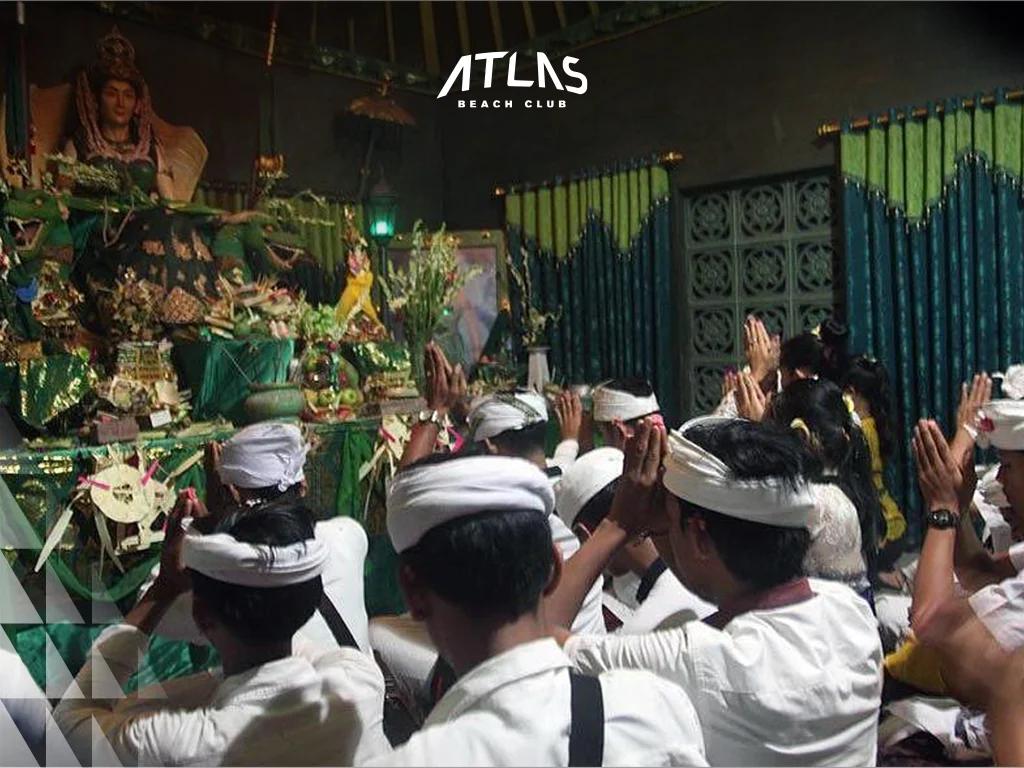
Siwaratri is a sacred Hindu holiday in Bali, dedicated to Lord Shiva. It is observed by Hindus as a day of fasting, prayer, and spiritual reflection. Siwaratri Day is considered one of the most sacred nights of the Hindu calendar in Bali. Locals believe that on this day, Lord Shiva meditates on Mount Meru and all negative elements are cleansed.
The main observances include:
- Nightlong prayers at temples.
- Offerings to Lord Shiva in the form of fruits, flowers, and incense.
- Bali’s temples, especially the ones dedicated to Shiva, will be filled with spiritual activities and rituals.
While businesses may be closed or operate with reduced hours, international tourists can still visit Bali’s natural attractions or partake in wellness and spa activities to immerse themselves in the serene atmosphere that takes over the island.
Saturday, 8 February – Saraswati Day (Hari Raya Saraswati)
Saraswati Day honors the goddess of wisdom, knowledge, and the arts. Saraswati is widely revered in Bali, and this holiday is particularly special for students, scholars, and artists. On this day, offerings are made to Saraswati, and books, musical instruments, and sacred texts are given special attention.
Key traditions on this day include:
- Offering prayers to Saraswati at temples and homes.
- Decorating and blessing books, papers, and other learning tools.
- Cultural performances and rituals to celebrate the goddess’s blessings on creativity and education.
This day is full of vibrant cultural activities, and Bali’s temples will host ceremonial dances, music, and other forms of artistic expression. It’s a great day for international visitors to witness Bali’s deep connection to art and spirituality.
Wednesday, 12 February – Pagerwesi Day (Hari Raya Pagerwesi)
Pagerwesi Day is a day of worship and prayer dedicated to Lord Vishnu, the protector of the universe. The day is observed with special ceremonies meant to strengthen the protection of one’s family and community. It is also a day to honor the teachings of the Balinese Hindu philosophy and to ask for guidance from the gods.
Celebrations on Pagerwesi Day include:
- Ceremonial prayers and rituals at local temples.
- Offerings and blessings made by Balinese families to invite prosperity and protection into their lives.
- Bali’s communities gather to share food and worship together, creating a communal and spiritual atmosphere.
For tourists, this is an excellent opportunity to observe local customs and experience the warmth of Bali’s communal celebrations.
Tuesday, 22 April – Penampahan Galungan (Hari Raya Penampahan Galungan)
Galungan is one of Bali’s most significant Hindu holidays. It celebrates the victory of good over evil and the balance of the universe. Penampahan Galungan is the day when families prepare for the main Galungan celebrations. On this day, they make offerings, decorate their homes with penjor (tall bamboo poles decorated with flowers and fruit), and prepare the sacred foods for the festival.
Penampahan Galungan is marked by:
- Preparation of offerings for the Galungan ceremony.
- Decorating homes and temples with traditional Balinese decorations.
- Community prayers and temple rituals.
Tourists visiting Bali during this time will experience a visually stunning celebration, with the island decorated in vibrant colors and lively processions taking place in every village.
Wednesday, 23 April – Galungan Day (Hari Raya Galungan)
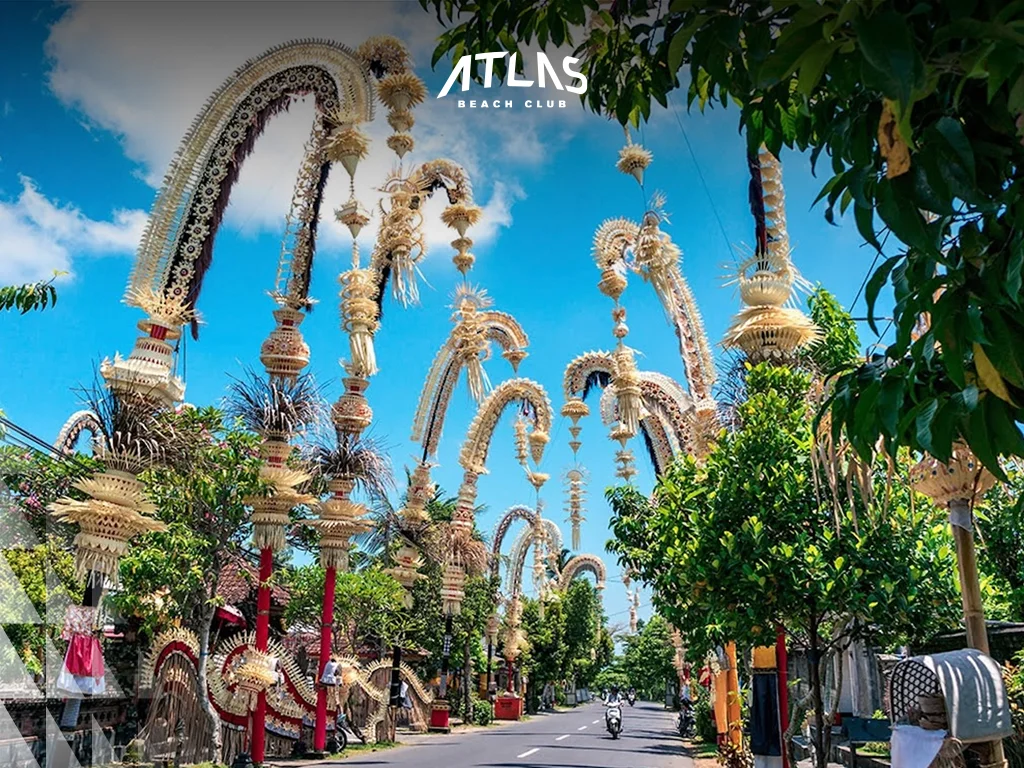
Galungan marks the victory of good over evil, a theme common in Hinduism. It celebrates the return of ancestral spirits to the Earth, and Bali comes alive with colorful celebrations and ceremonies. It is a time for Balinese families to come together and honor their ancestors.
On Galungan Day, Bali will be filled with:
- Ceremonial prayers in homes and temples.
- Penjor poles beautifully decorated along the streets, representing the offerings to the gods and ancestors.
- Traditional dances and performances at local temples.
This is one of the most important public holidays in Bali, and international tourists will be able to see the island in full cultural bloom. Visitors can join in the festivities, admire the traditional offerings, and participate in temple ceremonies with the locals.
Thursday, 24 April – Umanis Galungan
The day after Galungan is called Umanis Galungan, and it is a time for the Balinese people to reflect on the celebrations and give thanks for the blessings received during the Galungan festival. This day is often quieter than the main Galungan celebration but still involves important rituals and family gatherings.
Key features of Umanis Galungan include:
- Thanksgiving prayers at homes and temples.
- Small ceremonies to honor the ancestors and the gods.
- Family gatherings and community sharing of meals.
Tourists who are visiting during this time can enjoy a more peaceful atmosphere, with fewer crowds at the major tourist spots, while still being able to witness Balinese traditions.
Wednesday, 30 April – Kuningan Day (Hari Raya Kuningan)
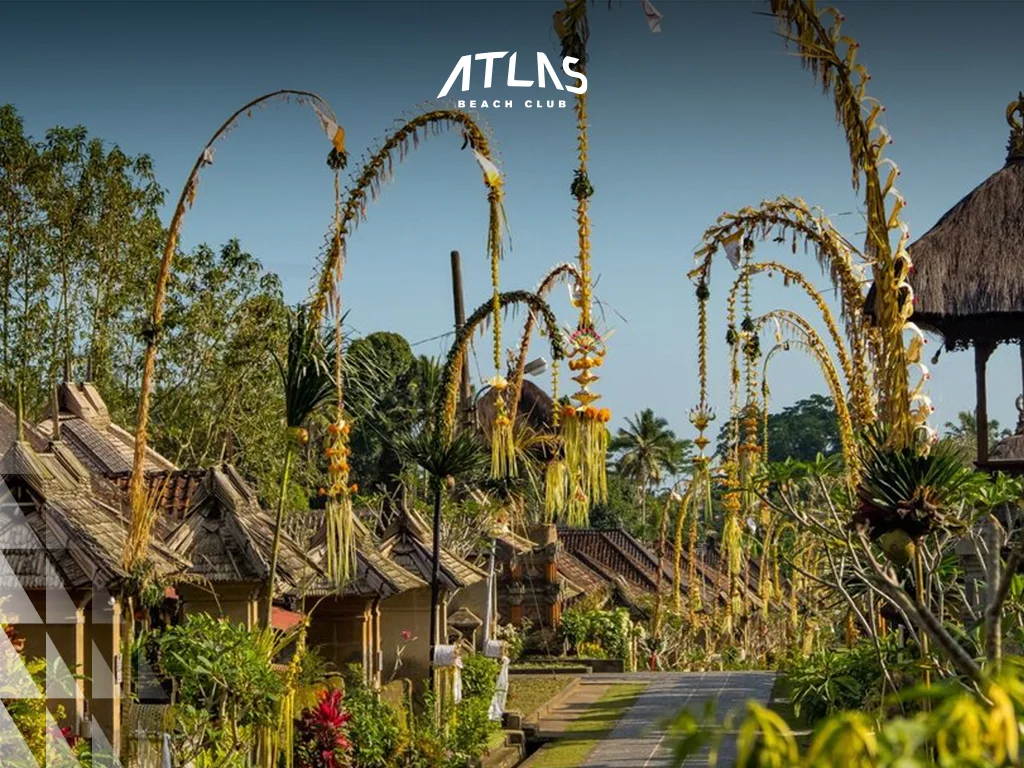
The Kuningan holiday marks the final day of the Galungan celebration. It’s a time to honor the spirits of the ancestors and to give thanks for their guidance and protection. Much like Galungan, Kuningan is a deeply spiritual holiday, and ceremonies are held to ensure a good future for the family and community.
On Kuningan Day, the celebrations include:
- Final offerings made at homes and temples.
- Rituals to honor the ancestors and the gods, asking for continued blessings.
- Traditional dances and other cultural performances.
For international tourists and foreign tourists alike, Kuningan Day provides another opportunity to witness the rich Hindu culture of Bali in a traditional and ceremonial setting.
Wednesday, 10 September 2025 – Pagerwesi Day (Hari Raya Pagerwesi)
Just like the earlier Pagerwesi Day, this celebration is another occasion to honor Lord Vishnu and to ensure spiritual protection for families and communities. Bali’s temples will be filled with prayers and rituals aimed at invoking peace and prosperity.
Tuesday, 18 November – Penampahan Galungan (Hari Raya Penampahan Galungan)
This is a second celebration of the Galungan festival, similar to the earlier Penampahan Galungan, and is celebrated with similar offerings and prayers.
Wednesday, 19 November – Galungan Day (Hari Raya Galungan)
A second Galungan Day, providing another opportunity to experience Bali’s deeply spiritual rituals and community gatherings.
Thursday, 20 November – Umanis Galungan
Another peaceful day of reflection following the second Galungan celebrations. Bali’s local communities continue to gather for prayers and meals.
Saturday, 29 November – Kuningan Day (Hari Raya Kuningan)
This concludes the Galungan celebrations for the second cycle, and once again, visitors can experience Bali’s spiritual traditions and rituals.
Collective Leave Dates in Indonesia
In addition to the national public holidays, Indonesia also observes collective leave dates. These are days when many employees take leave, creating long weekends for citizens and residents. These dates are important to consider when traveling to Bali, as they can affect the availability of services and transportation.
FAQs
No, Bali has its own set of local holidays that are unique to the island.
It depends on your preference. Nyepi is a day of silence, so most of Bali shuts down for the day. However, if you want to experience a unique cultural atmosphere, it’s a fascinating day to visit.
Galungan is a Balinese Hindu holiday celebrating the victory of dharma (good) over adharma (evil). Offerings, prayers mark it, and the erection of beautifully decorated bamboo poles called penjor along streets, symbolizing gratitude and prosperity.
Yes, but with respect. Visitors can join temple ceremonies if they dress appropriately (usually wearing a sarong and sash) and follow local customs. It’s important to seek permission and observe quietly to avoid disrupting the rituals.
The Bali Kite Festival is a vibrant event where giant, intricately designed kites are flown, often accompanied by traditional gamelan music. It’s not just a fun competition but also a religious activity to send messages to the gods for bountiful harvests and prosperity.

Conclusion
Knowing the public holiday in Bali 2025 can help you plan your visit more effectively, allowing you to enjoy the best of both national and local celebrations. Whether you’re planning to enjoy Bali’s vibrant festivals, religious holidays, or quiet days of reflection, this guide helps you stay informed. For international tourists, don’t forget to check out local attractions like Atlas Beach Club, a fantastic spot to relax and enjoy Bali’s beautiful coastline.
By planning around these dates, you can ensure a memorable and enriching experience in Bali and Indonesia in 2025.
Other Articles
Where is Bali? Bali is a small island that has an incomparable uniqueness. However, Bali is also known as a tourist destination that must be on the bucket list of tourists. But still, lots of people ask, “Where is Bali island located?”. Please note that Bali is an island located in a country called Indonesia. […]
Bali Indonesia Also known as the Land of the Gods and Island of a Thousand Temples. Bali, Indonesia, fascinates the culture passed down from its ancestors with its dramatic dances, traditional music that hypnotizes the mind, ceremonies that are full of meaning and sacred, arts and crafts, to its luxurious hotels and resorts. In Bali, […]
Best Time to Visit Bali Bali is one of the best tourist destinations in the world. Bali has many variations of tourism that you can experience. Even though it has many recreational options, the most important things must be known before you go to Bali. When is the best time to visit Bali? Weather in […]
